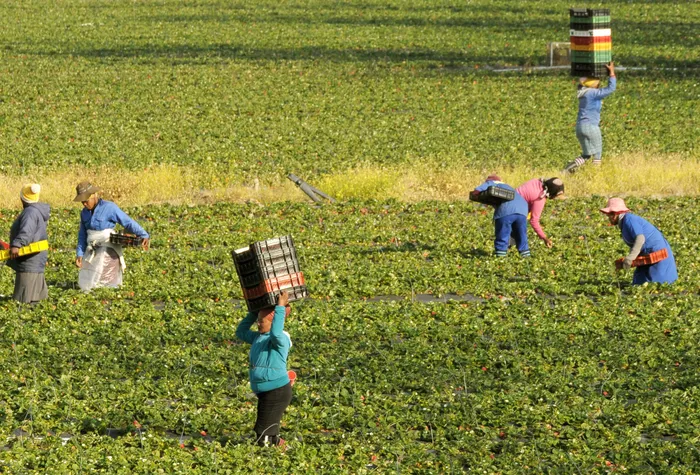State bank is timeous ‘to serve the masses’

Farm workers out in the field harvesting strawberries in Stellenbosch, Western Cape. A State Bank, which the president signed into law in 2023, is a necessity in the struggle for economic development, not least in agriculture, especially with the all important task of ensuring food security, for commercial and emerging farmers, the writer says.– Picture: Tracey Adams / African News Agency (ANA) / September 11, 2021
By Trevor Ngwane
At long last South Africa will see the establishment of a state bank. The president, Cyril Ramaphosa, signed the Post Bank Limited Amendment Bill into law in September last year and the South African Reserve Bank’s prudential authority must now formalise this in a licence.
The ANC prides itself on being the oldest liberation movement in Africa which might explain why it has taken nearly 30 years to establish a state bank.
In contrast, when Jan Smuts and his Boer generals took power in 1910, snatching victory out of their defeat in the Anglo-Boer War of 1899-1902, the first thing they did was establish a land bank. In 1912, they set up the Land and Agricultural Development Bank of South Africa to serve (white) South Africa’s commercial and emerging farmers by providing suitable financial services. White agriculture still enjoys the benefits of this to this day.
The banks, to quote Vladimir Lenin, the leader of the Russian Revolution “are centres of modern economic life, the principal nerve centres of the whole capitalist economic system”. “To talk about ‘regulating economic life’ and yet evade the question of the nationalisation of the banks means either betraying the most profound ignorance or deceiving the common people”.
Clearly, this is a point that the Boer generals, who represented the interests of landowners, took to heart in their economic policies.
A state bank is a necessity in the struggle for economic development.
Using the debatable GDP per capita index, data from the IMF shows that South Africa has dropped from $6,680 in 2022 to $6,190 last year – the same level of GDP per capita as in 2005. In the words of Maarten Ackerman, chief economist at Citadel, “we are not outpacing population growth”. “And this, in fact, implies that we are in a per capita recession.”
A state bank – which we now know is going to be the Postbank – at least to begin with, can help stimulate meaningful economic growth in the country.
“The inability of the economy to break out of its current growth profile does not bode well for the country’s unemployment crisis and socio-economic challenges,” said Elize Kruger, an independent economist.
For example, the state bank can contribute towards lifting investment towards infrastructure from the current 15 percent of GDP to 30 percent.
A well-functioning and regulated state bank will provide relief for the working class and the poor, including struggling small businesses. Its mandate will be to serve the masses.
The World Economic Forum estimates that 5.78 million small- and medium-sized enterprises (SMEs) in South Africa don’t have bank accounts because of high bank charges and transaction fees.
The state bank can offer affordable credit to small businesses and continue the mandate of the Post Bank to distribute social grants to beneficiaries, thus protecting them from the predatory practices and the high bank charges of the commercial banks.
Many SA Social Security Agency (Sassa) recipients are suffering due to the closure of post office branches in the localities.
There is a degree of scepticism and opposition to a state bank from some sectors. One argument is that banking should be left to the private sector, especially because of the ANC’s mismanagement of the state-owned entities (Eskom, SAA and Passenger Rail Agency of South Africa).
A closely related argument is the corruption that has mired many of the state-owned entities (SOEs) under the ANC’s watch. These are important and valid arguments; the state bank will fail if is run by people imbued by the spirit of self-enrichment. However, some people oppose a state bank because of pro-private sector and anti-state ideological sentiments; this may be a case of the pot calling the kettle black.
Private banking and the bankers who run it are not saints. There have been too many instances of mismanagement and thievery for us to idealise this sector.
The Forex Cartel case against 28 local and transnational banks that was spearheaded by the Competitions Commissions is an example of the chicanery that goes on in bank boardrooms. Banks stand accused of collaborating in manipulating currency exchange rates with the aim of profiteering. Several of the accused banks have paid millions of dollars in admission of guilt fines.
In South Africa and the US, banks are routinely accused of racism, including providing discriminatory banking services based on racial profiling of individuals and neighbourhoods.
We should not throw the baby out with the bathwater. The country needs a state bank, it just does not need the ANC to run it. There is nothing wrong with state intervention in the economy in the form of establishing a state bank. There is everything wrong with a national liberation movement that has forgotten where it comes from and only remembers its mandate when it is on the verge of losing power in the elections.
The state bank will serve the people and not the banksters and profiteers. It will be a stepping stone towards the amalgamation of all the state banks, the Land Bank, Public Investment Corporation, Ithala and the Industrial Development Corporation of SA with a view to dragging this country out of its current economic doldrums. It cannot be business as usual.
Dr Trevor Ngwane is Director of the Centre for Sociological Research and Practice at the University of Johannesburg.